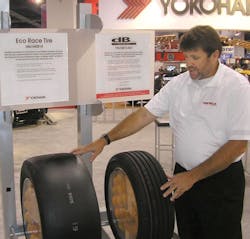How fast is the green movement making an impact on the automotive aftermarket? If the large number of environmentally friendly products at this year’s SEMA Show is any indication, very quickly indeed.
Only time will tell how well those products are embraced by retail tire dealers and their customers, however.
In the tire industry, low rolling resistance is the green trend of choice.
Three manufacturers highlighted tires that save fuel because they roll more freely than previous generation tires.
Yokohama Tire Corp. displayed its new dB Super E-spec passenger tire and experimental Eco Race Tire at its booth. A compound made predominantly of natural rubber and citrus oil replaces petroleum-based materials in both tires.
Cooper Tire & Rubber Co. introduced its GFE (for greater fuel economy) touring tire, which the company says features low rolling resistance without a corresponding loss in traction or tread life. Hankook Tire America Corp. showcased a painted green tire to symbolize its efforts in going green (that tire, the enfren, is sold only in Asia at the moment).
According to Matt Edmonds, vice president of The Tire Rack, low rolling resistance is just one performance element of a tire.
Edmonds, who gave tours of the green products at the Tire Industry Association-sponsored Tires, Wheels & Equipment section of the show, says dealers shouldn’t put too much emphasis on today’s green tires.
[PAGEBREAK]
“Low rolling resistance is going to be the next thing we’re going to come out with as an industry to help consumers evaluate a tire selection. But consumers should use low rolling resistance as a tiebreaker when deciding on what to buy.
“They should first be concerned with the technical aspects of the tire — size, speed rating, load rating. Then they should try to find out what tire fulfills their need for traction, whether it’s an all-season, winter or traction tire. Does it fulfill their subjective needs in regards to noise and ride comfort, and their budget in regards to price and wear of the tire? Once they’ve narrowed their choices down in those areas, then they can look at rolling resistance.”
Edmonds says the push to more fuel-efficient tires is being driven by vehicle manufacturers trying to meet CAFE (Corporate Average Fuel Economy) standards. “The fact remains, the difference in rolling resistance between tire manufacturers and tire models in the top tier is very small. That results in a very minimal difference in the fuel economy of your vehicle.”
Other green technologies
From the inside out, vehicles are becoming more eco-friendly. How else do you explain the electric F-150 prototype, which Ford Motor Co. exhibited on the trade show floor?
KYB Corp. says it is looking at replacements for the oil used in its dampers. Three of the alternatives being studied are: biodegradable oil, gas and water soluble fluid. “It’s real-world stuff,” says Marketing Manager Aaron Shaffer, who adds there is no timetable for developing the dampers.
ArvinMeritor Inc. is transitioning from a spray process to a dipping process in the painting of its Gabriel shocks and struts. The “autodeposition,” or chemical reaction, paint method eliminates VOC (volatile organic compound) emissions, and reduces natural gas usage because curing time and temperature are reduced.
It also provides a better, more consistent coating, according to Senior Communications Consultant Jeff Gammons, which “increases productivity on the line by virtually eliminating re-paint.”
There were a number of lead-free wheel weights at the show. The Automotive Division of 3M unveiled its line of lead-free composite 3M Mechanical Replacement Wheel Weights.
The corrosion-free weights, which are contoured to the shape of the rim, will stick to any wheel under any condition, according to Business Director Greg Piserchia. The highly flexible, malleable wheel weight material comes on a roll and can be cut to exact weight requirements.
Trax JH Ltd. 600 series steel adhesive weights made their U.S. debut. “Because the American market is moving towards lead-free weights, and because we’re already making lead-free weights, we wanted to explore business opportunities in America,” says Managing Director John Halle.
He believes Trax weights can “compete with locally manufactured lead weights” despite the cost of exporting them from the United Kingdom. ■
About the Author

Bob Ulrich
Bob Ulrich was named Modern Tire Dealer editor in August 2000 and retired in January 2020. He joined the magazine in 1985 as assistant editor, and had been responsible for gathering statistical information for MTD's "Facts Issue" since 1993. He won numerous awards for editorial and feature writing, including five gold medals from the International Automotive Media Association. Bob earned a B.A. in English literature from Ohio Northern University and has a law degree from the University of Akron.
